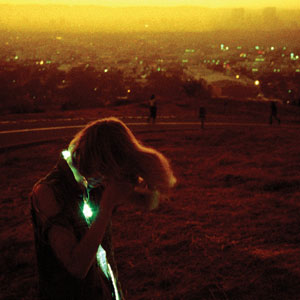Neon Indian Era Extraña
According to 23-year-old artist Alan Palomo (a.k.a. Neon Indian), the title of his sophomore LP, […]

According to 23-year-old artist Alan Palomo (a.k.a. Neon Indian), the title of his sophomore LP, Era Extraña, can be translated to mean a few different things. Apparently, extraña is both the Spanish word for “strange” and “to miss something.” Whether a coincidence or not, the dichotomy makes perfect sense; Palomo’s kind of electronic pop music is utterly soaked in nostalgia, and crafted with an off-kilter essence at its core. The genre-defining Psychic Chasms LP effectively married those ideas together in each of its 12 tracks, with a distinct focus on evoking AM radio pastiche and post-high school slackerisms. Now, just a couple of years later, the unwitting king of chillwave seems to have grown up in a sense. Neon Indian’s second album is a collection of more serious and straightforward pop tunes that separate his penchants for the past and its oddities, and shed nearly all trademarks of the dubious genre he haphazardly pioneered.
If Psychic Chasms was an homage to synth pop and broken radios, Era Extraña culls its inspiration from shoegaze and new-wave records. Palomo’s trademarks—woozy synth melodies, filtered drum beats, and slyly infectious vocal hooks—are still fully intact, but they’ve been amended with crunchy guitar fuzz, thick analog synth tones, and a heavy wash of reverb. And that’s not to mention his new-found clarity in production style (thanks in part to producer Dave Fridmann, who has previously polished acts such as Black Moth Super Rainbow, MGMT, and Flaming Lips), an increasingly apparent trend that has left some people wishing these chillwave artists (e.g. Toro Y Moi, Memory Tapes) would’ve stayed in the bedroom.
However, Neon Indian wears his studio time well. It’s obvious he’s no longer aiming solely for the blog-gobbling music fan; tracks like the hook-laden “Hex Girlfriend,” album standout “Halogen (I Could Be a Shadow),” and slow-burning “Suns Irrupt” have a distinct ‘made-for-MTV2’ vibe crammed neatly between each four-chord guitar riff and backing vocal melody. Those kinds of songs are occasionally broken up by brief instrumentals that allow Neon Indian’s gearhead side a chance to play around with some analog toys, the results of which merely serve the purpose of denoting the beginning, middle, and end of Era Extraña.
That’s just about where Palomo the producer is on his new album, but where is the singer/songwriter Palomo in the midst of all this change? Well, he’s no longer “the wizard behind the curtain,” to be sure. The artist has stepped into the spotlight, albeit somewhat sheepishly—allowing emotions a bit deeper than the regret of not taking drugs with a friend into his enigmatic lyrics, and delivering them with a more upfront, patently breathy singing voice. It’s there that Era Extraña‘s main fault lies: Palomo is a better puppetmaster than a frontman. His effect-addled vocals exude just about the same confidence and allure of one of the stoned teenagers he so often referenced on Psychic Chasms. It’s a challenging role that Palomo bestowed upon himself, one he’ll hopefully grow into the next time around.

